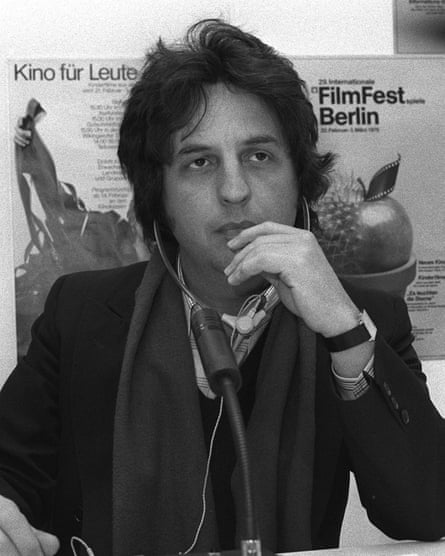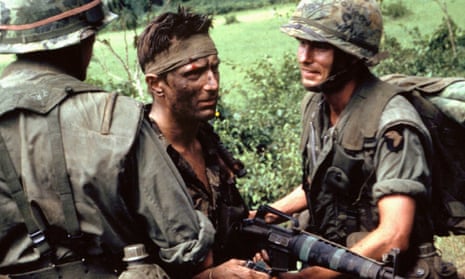It took just over two years for the film-maker Michael Cimino, who has died aged 77, to go from being one of the figureheads of the ambitious and intelligent US cinema of the 1970s to the man blamed for killing it off. The peak of his career was The Deer Hunter (1978), the first in a spate of pictures to articulate the effect on the American psyche of the Vietnam war. It was divided into three distinct sections depicting a group of Pennsylvania steelworkers before, during and after the war.
Cimino was criticised for sequences in which the soldiers are forced by the Vietcong to play Russian roulette against one another. He was also accused of expressing rightwing sentiments in the final scene, during which the surviving characters sing God Bless America.

These controversies could not overshadow the strength of the film-making, or the wealth of elegiac material that explored the men’s friendships with uncommon patience and tenderness. The early scenes showing a raucous wedding party that spills into the deserted streets, followed by a haunting early-morning hunting trip, were especially fine, and proved that Cimino had a talent for expressing theme and emotion in visual terms. The backdrop of the steel mills was crucial and evocative. “In a strange way, the mills become a symbol of life,” he explained. “People go but the mills are there.”
He was a masterful, intuitive director of actors, ensuring a consistency of performance from a cast that included Robert De Niro alongside relative newcomers Meryl Streep and Christopher Walken, who won an Oscar for his performance as the most sensitive member of the group. Streep’s then partner, John Cazale, also starred; though his bone cancer was at an advanced stage, Cimino hid his illness from the studio and managed to get all the actor’s scenes filmed before he died.
The Deer Hunter won five Oscars, including best picture and best director. For all its harrowing moments, Cimino considered it a hopeful work. “It has a positive feeling for life, an admiration for the characters’ abilities to go on after a horrendous experience and go on in a quiet way. There’s a great deal of open sentiment in the film; people say, ‘I love…’ They’re passionate about things.”
Encouraged by its success, United Artists gave Cimino total creative and financial freedom on his next film, the western Heaven’s Gate (1980), starring Kris Kristofferson, Isabelle Huppert and John Hurt. It was a decision that would bring about the downfall of director and studio – UA, founded in 1919, was sold to MGM in 1981.
Cimino’s interest in the Johnson County war of 1892, when a stockgrowers’ association in Wyoming hired mercenaries to defend their land monopoly by wiping out European immigrants, dated back to the early 1970s, when he had first written a script on the subject. It had been rejected by one studio as “a pretty downbeat story at a pretty heavy cost”, but the escalation in his standing after The Deer Hunter made it a viable proposition.
However, an initial budget of $11.5m proved unrealistic. After six days’ shooting, the production was five days behind schedule. By the time it was finished 11 months later, the budget had snowballed to a reported $44m, Cimino had shot 1.3m feet of film and the title had become a byword for hubris and folly.
The beauty of the picture was undeniable. “It looks like David Lean decided to make a western,” said the producer Steven Bach after seeing a rough cut. (Bach later wrote a salutary 1985 book about the debacle, Final Cut: Dreams and Disaster in the Making of Heaven’s Gate.) But in the search for absolute authenticity, which included establishing at great cost a vast irrigation system beneath the site of the film’s key battle, Cimino had exploited the studio’s weak management.
A 219-minute version of Heaven’s Gate premiered at the end of 1980 (cut down from an initial 325 minutes), and was savaged by critics. This was quickly withdrawn and replaced by a cut that was 70 minutes shorter but even less coherent; it was a predictable and costly flop, with Cimino’s sudden reversal of fortune only compounding the sense of disaster.
Michael was born in New York City and grew up in Long Island. His father was a music publisher and his mother a clothing designer. He was educated at Westbury high school and Michigan State University before studying painting, architecture and art history at Yale.
He enjoyed a successful career as a commercials director in New York, widely admired for his advertisements for high-profile clients including United Airlines and Pepsi, but renowned even then for his perfectionism. He began writing screenplays and moved to Los Angeles in 1971. The following year, he got a co-writing credit (as “Mike Cimino”) on Silent Running, a science-fiction drama with environmental concerns.
Realising he needed to get a major star attached to one of his scripts, he wrote Thunderbolt and Lightfoot, a heist-cum-buddy movie, in six weeks and offered it to Clint Eastwood. After hitting it off with Cimino, Eastwood agreed to let the young writer direct. He also hired him to do rewrites on the second Dirty Harry movie, Magnum Force (1973). With Thunderbolt and Lightfoot (1974), which starred Eastwood and Jeff Bridges, Cimino exhibited a breezy touch and knowing wit that would never again be associated with his name.
In the aftermath of Heaven’s Gate, he had clearly exhausted his credit in Hollywood and lost his way. He directed only four more films, none of them well-received. Year of the Dragon (1985), co-written with Oliver Stone, was accused of perpetuating negative stereotypes about Asian-Americans. The Sicilian (1987), Desperate Hours (1990) and Sunchaser (1996) were largely ignored, though he wrote a novel, Big Jane (2001), which was highly regarded in France.
Cimino became reclusive in recent years, with his own agent describing him as “the Howard Hughes of Hollywood”. Drastic alterations to his appearance fuelled erroneous rumours that he was undergoing gender reassignment surgery. It wasn’t only his face that changed dramatically: with the unveiling in 2012 of a new 216-minute cut of Heaven’s Gate, an increasing number of critics fell in step with early admirers such as the Observer’s Philip French, who called it “a towering masterpiece” and “one of the finest westerns ever made”. Perhaps in time it will be forgiven for contributing to the end of an era in which directors could pursue expensive personal visions on the studio dime.
Though he was elusive about every aspect of his private life, he claimed in a 2000 interview to have a college-age daughter.

Comments (…)
Sign in or create your Guardian account to join the discussion